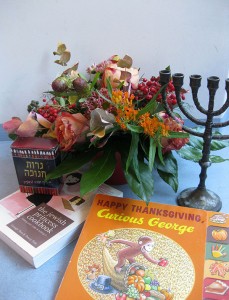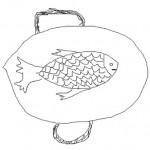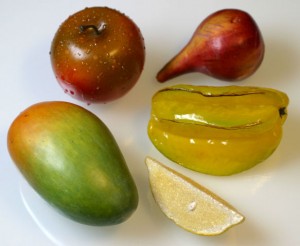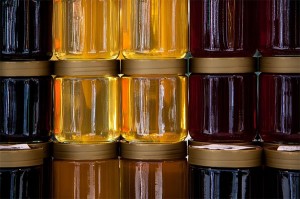Menurkeys for Thanksgivukkah?

Research under way in preparation for Thanksgivukkah
Photo: Signe Rossbach
Chanksgiving! As a family of German-American Jewish-Protestant-Catholic-Puritan backgrounds, we do like to celebrate as many holidays as we can possibly fit into our family schedule – with Halloween, our twins’ birthday and the classic German lantern parade for St. Martin’s day making for an action packed twelve days at the beginning of November.
After a bit of a breather we’re heading into the next holiday season – with a bit of a twist this year. Usually Hanukkah – the Jewish festival of lights and miracles – is associated with the Christian festival of lights and a miraculous birth: Christmas. And that makes sense, sort of, superficially at least. A few years ago we had an entire exhibition titled “Chrismukkah” – a cultural history of the evolution of the two holidays, and this year on December 3, Rabbi Daniel Katz will present a truly enjoyable talk on how they really don’t fit together at all.
But Thanksgiving? → continue reading
Employees of the Jewish Museum Berlin respond:
“When I think back, I remember first of all friends and family, followed by food – a whole lot of food.” Roland Schmidt, Host
“I remember the meals at my grandmother’s as so sumptuous and sprawling that I had the feeling I needed to fast not just on Yom Kippur but for the whole rest of the year.” Alina Gromova, Academic Employee in the Fellowship Program, and Guide

© Alina Gromova, Jewish Museum Berlin
“To stay on the culinary topic, I can bring up the days when gefilte fish was still cooked at home. You would order two carp at the fishmonger – who was doing enough business in September to last the entire year, because the customers celebrating Rosh ha-Shanah would stand in line for live fish. You would carry home the floundering content in a metal bucket on the tram, accompanied by the cold glares of ditrustful animal rights activists sitting near you. → continue reading

Apple, mango, fig, star fruit, lemon
We posed this question to employees of the Jewish Museum Berlin. Some answered curtly, such as one colleague who “doesn’t usually do anything (aside from dipping a few pieces of apple in honey…).” Others answered indirectly via an out-of-office message which ended with “Cordial greetings and Shanah Tovah.” Here are some additional responses:
“I’m going to go to my grandmother’s for Rosh ha-Shanah, like every year. With one difference: I’m hoping that she will follow my advice this year and forget to warm up the gefilte fish before serving it, because it tastes better cold.” Alina Gromova, Academic Employee in the Fellowship Program, and Guide

Honey, source: Pixabay, CC0 license
“Like every year, we observe erev Rosh ha-Shanah at a dinner with friends, which we sanctify by reciting various blessings. We dip apples in honey and buy rare fruit which relinquish their mysteries upon consumption. We celebrate the New Year culinarily, with new, unknown foods to discover, resulting in a kind of biology intelligence test. Unfortunately there are never any kreplach to follow because no one knows how to prepare them anymore, and the gefilte fish comes, if at all, out of a jar. Making it would take days, but worse, cooking fish gives off a smell which fills the entire house, and might drive away the neighbors, and not only the disagreeable ones… The remaining array of dishes is unspectacular. Over the next two days, some of the dinner guests attend synagogue – chosen either out of nostalgia for childhood memories, or out of liturgical interest.” Cilly Kugelmann, Program Director → continue reading



